Jesuits Offer Pardon to Colonel Involved with 1989 El Salvador Murders
BY ISN STAFF | June 15, 2017
In late May, the Jesuits of El Salvador asked the Salvadoran government to commute a former military colonel’s prison sentence for the 1989 killings of Ignacio Ellacuría, S.J., Ignacio Martín-Baró, S.J., Segundo Montes, S.J., Juan Ramón Moreno, S.J., Joaquín López y López, S.J., Amando López, S.J., and their housekeeper Elba Ramos, and her 15-year-old daughter Celina Ramos, all murdered at the University of Central America in San Salvador, El Salvador, on November 16 of that year.
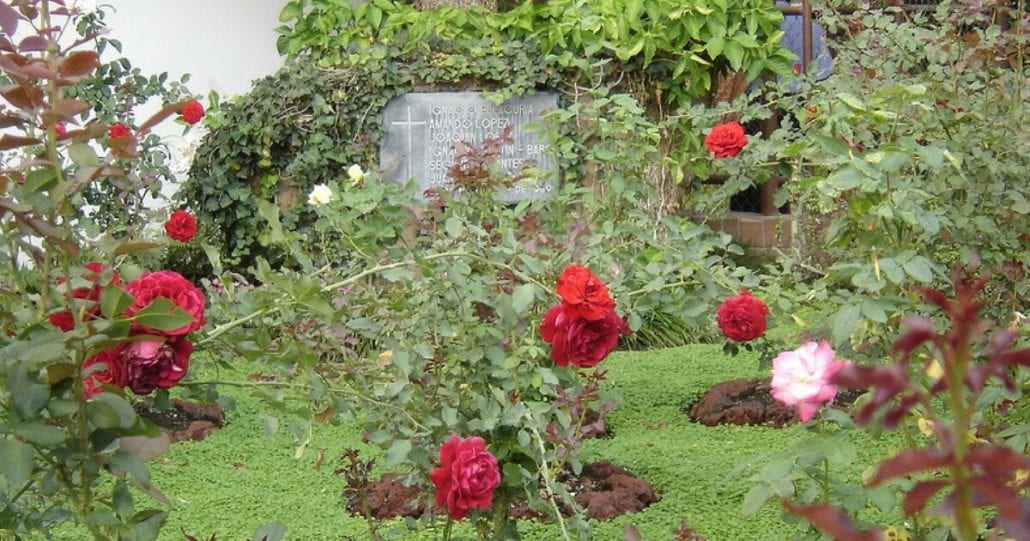
The rose garden commemorating the Jesuits and their companions adjacent to the Jesuit residence at the University of Central America [Source: John Donaghy, Creative Commons]
“We make this petition on the basis that, from our perspective, the process of truth, justice and reparations has been fulfilled,” said Fr. Andreu Oliva, S.J., president of the Jesuit’s University of Central America José Simeón Cañas in El Salvador, in remarks to the media regarding the announcement.
In an official statement released by the Jesuits, they noted that “as victims and as Christians” they have always expressed a willingness to pardon as long as “recognition of truth, determination of responsibilities, repair, and purpose of non-repetition” are present, and that these requirements have been met in the case of Colonel Benavides.
The original statement was published in Spanish — an English translation can be found below.
University of Central America (UCA), Jose Simeon Canas
The UCA Institute of Human Rights
STATEMENT
Petition for commutation of sentence in favor of
Colonel Guillermo Benavides
The Society of Jesus and the University of Central America Jose Simeon Canas (UCA), victims of the November 16, 1989 massacre that took the lives of Elba and Celina Ramos and six Jesuits, respectfully petition the President of the Republic, through the Minister of Justice and Public Security, for the constitutional grace of commutation of sentence for Colonel Guillermo Benavides, so that his 30-year prison sentence be substantially reduced.
The commutation of sentence, from the perspective of transitional justice, can be the current constitutional instrument in the country so that the decision of the victims to forgive has a favorable impact on the legal status of a person responsible for serious human rights violations, as is in the case of Colonel Benavides for his participation in the UCA Massacre, categorized as a crime against humanity.
In particular, we request:
- That, as part of the commutation of sentence, the sentence of 30 years imprisonment imposed against Colonel Guillermo Benavides is reduced to the years he has already been detained in relation to the UCA Massacre (that is, the murders of Celina Mariceth Ramos, Julia Elba Ramos, Ignacio Ellacuría Beascoechea, Ignacio Martín-Baró, Segundo Montes Mozo, Juan Ramón Moreno Pardo, José Joaquín López López, and Amando López Quintana), both in the period of 1990 to 1993 and the period of 2016 to 2017, given the legal reasons, of health and age of the referred to man, as stated in the application. As of May 2017, it would be calculated as more than approximately 4 years of detention. Consequently, we request that Colonel Benavides recover his ambulatory freedom immediately, because we consider that the criminal responsibility judicially decreed against him, as one of the mediate authors of the massacre, has satisfied the attainment of the rights to truth, justice, and reparation, but only in relation to his participation.
- That, as part of the commutation of his sentence, Colonel Benavides’ name remains on police records and corresponding prison records as responsible for the assassinations that he has been convicted of, for a period of no less than ten years from when the commutation was granted. This is to recognize that his criminal responsibility has not disappeared, to promote the right of Salvadoran society to know the truth in full, and to guarantee that the grave violation of constitutional rights that the Massacre represents is not repeated. This is in full respect of our Constitution and the sentence against the Amnesty Law of 1993.
- That this petition of commutation of sentence, inspired by the judgment and the parameters of transitional justice, is understood as constitutionally valid because our participation is accounted for as active victims being duly informed, conscious, and free at the time of this decision.
- That this petition of commutation of sentence is NOT understood as a waiver of the right to seek compensation for the damage suffered, material and moral, because the victims or their families, in their case, cannot give up their constitutional rights, although they may decide not to exercise them. In this case, as a Jesuit community and university we will not exercise this right to compensation for the damage suffered in relation to the participation of Colonel Benavides.
- That this petition of commutation of sentence is NOT understood as a waiver of the right to truth, justice, and reparation in relation to the rest of the persons responsible for the Massacre, which up to now continue as fugitives without facing justice. The fight against impunity in relation to serious violations of constitutional rights is a constitutional and international obligation of the Salvadoran State which cannot be waived, as neither the victims and their families can give up their rights.
As victims and as Christians, we have always expressed our willingness to pardon, requiring knowledge and recognition of the truth, determination of responsibilities, repair, and purpose of non-repetition. In the case of Colonel Benavides, we believe that these conditions have been met.
San Salvador, May 29, 2017
The translation team for this statement included Natalie Hernandez, Lauren Ross, Sally Ulmer, Colleen Quigley, and Grace Hulseman, all alumni of the Casa de la Solidaridad (CASA) a praxis based study abroad program of Santa Clara University based in El Salvador. The CASA model invites students to live and study in El Salvador while being immersed in the social realities of the poor. The semester-long experience integrates rigorous study at the UCA with simple living in community and spiritual reflection in the Ignatian tradition.
[/av_promobox]


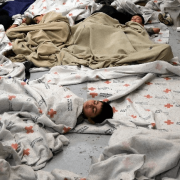
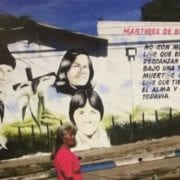
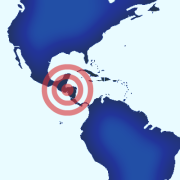
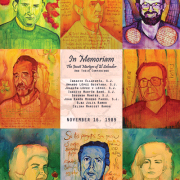
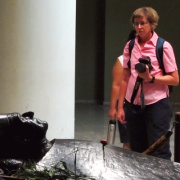
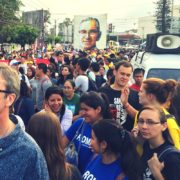

Leave a Reply
Want to join the discussion?Feel free to contribute!